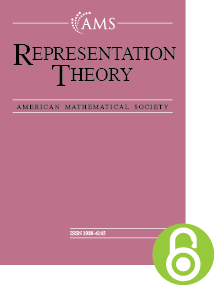Hall polynomials for affine quivers
HTML articles powered by AMS MathViewer
- by Andrew Hubery
- Represent. Theory 14 (2010), 355-378
- DOI: https://doi.org/10.1090/S1088-4165-10-00374-2
- Published electronically: April 30, 2010
- PDF | Request permission
Abstract:
We use Green’s comultiplication formula to prove that Hall polynomials exist for all Dynkin and affine quivers. For Dynkin and cyclic quivers this approach provides a new and simple proof of the existence of Hall polynomials. For non-cyclic affine quivers these polynomials are defined with respect to the decomposition classes of Bongartz and Dudek, a generalisation of the Segre classes for square matrices.References
- V. I. Arnol′d, On matrices depending on parameters, Uspehi Mat. Nauk 26 (1971), no. 2(158), 101–114 (Russian). MR 0301242
- Maurice Auslander, Idun Reiten, and Sverre O. Smalø, Representation theory of Artin algebras, Cambridge Studies in Advanced Mathematics, vol. 36, Cambridge University Press, Cambridge, 1997. Corrected reprint of the 1995 original. MR 1476671
- Pierre Baumann and Christian Kassel, The Hall algebra of the category of coherent sheaves on the projective line, J. Reine Angew. Math. 533 (2001), 207–233. MR 1823869, DOI 10.1515/crll.2001.031
- Klaus Bongartz and Dirk Dudek, Decomposition classes for representations of tame quivers, J. Algebra 240 (2001), no. 1, 268–288. MR 1830554, DOI 10.1006/jabr.2000.8705
- Philippe Caldero and Frédéric Chapoton, Cluster algebras as Hall algebras of quiver representations, Comment. Math. Helv. 81 (2006), no. 3, 595–616. MR 2250855, DOI 10.4171/CMH/65
- Philippe Caldero and Markus Reineke, On the quiver Grassmannian in the acyclic case, J. Pure Appl. Algebra 212 (2008), no. 11, 2369–2380. MR 2440252, DOI 10.1016/j.jpaa.2008.03.025
- William Crawley-Boevey, Exceptional sequences of representations of quivers, Proceedings of the Sixth International Conference on Representations of Algebras (Ottawa, ON, 1992) Carleton-Ottawa Math. Lecture Note Ser., vol. 14, Carleton Univ., Ottawa, ON, 1992, pp. 7. MR 1206935
- Bangming Deng and Jie Xiao, A new approach to Kac’s theorem on representations of valued quivers, Math. Z. 245 (2003), no. 1, 183–199. MR 2023959, DOI 10.1007/s00209-003-0541-z
- Vlastimil Dlab and Claus Michael Ringel, Indecomposable representations of graphs and algebras, Mem. Amer. Math. Soc. 6 (1976), no. 173, v+57. MR 447344, DOI 10.1090/memo/0173
- Peter Gabriel, Unzerlegbare Darstellungen. I, Manuscripta Math. 6 (1972), 71–103; correction, ibid. 6 (1972), 309 (German, with English summary). MR 332887, DOI 10.1007/BF01298413
- C. G. Gibson, Regularity of the Segre stratification, Math. Proc. Cambridge Philos. Soc. 80 (1976), no. 1, 91–97. MR 414928, DOI 10.1017/S0305004100052701
- James A. Green, Hall algebras, hereditary algebras and quantum groups, Invent. Math. 120 (1995), no. 2, 361–377. MR 1329046, DOI 10.1007/BF01241133
- V. G. Kac, Infinite root systems, representations of graphs and invariant theory, Invent. Math. 56 (1980), no. 1, 57–92. MR 557581, DOI 10.1007/BF01403155
- Victor G. Kac, Infinite-dimensional Lie algebras, 3rd ed., Cambridge University Press, Cambridge, 1990. MR 1104219, DOI 10.1017/CBO9780511626234
- Andrew Hubery, Symmetric functions and the centre of the Ringel-Hall algebra of a cyclic quiver, Math. Z. 251 (2005), no. 3, 705–719. MR 2190352, DOI 10.1007/s00209-005-0830-9
- I. G. Macdonald, Symmetric functions and Hall polynomials, 2nd ed., Oxford Mathematical Monographs, The Clarendon Press, Oxford University Press, New York, 1995. With contributions by A. Zelevinsky; Oxford Science Publications. MR 1354144
- Markus Reineke, Counting rational points of quiver moduli, Int. Math. Res. Not. , posted on (2006), Art. ID 70456, 19. MR 2250021, DOI 10.1155/IMRN/2006/70456
- Christine Riedtmann, Lie algebras generated by indecomposables, J. Algebra 170 (1994), no. 2, 526–546. MR 1302854, DOI 10.1006/jabr.1994.1351
- Claus Michael Ringel, Hall algebras and quantum groups, Invent. Math. 101 (1990), no. 3, 583–591. MR 1062796, DOI 10.1007/BF01231516
- Claus Michael Ringel, Hall polynomials for the representation-finite hereditary algebras, Adv. Math. 84 (1990), no. 2, 137–178. MR 1080975, DOI 10.1016/0001-8708(90)90043-M
- Claus Michael Ringel, The composition algebra of a cyclic quiver. Towards an explicit description of the quantum group of type $\~A_n$, Proc. London Math. Soc. (3) 66 (1993), no. 3, 507–537. MR 1207546, DOI 10.1112/plms/s3-66.3.507
- Claus Michael Ringel, Green’s theorem on Hall algebras, Representation theory of algebras and related topics (Mexico City, 1994) CMS Conf. Proc., vol. 19, Amer. Math. Soc., Providence, RI, 1996, pp. 185–245. MR 1388564
- Claus Michael Ringel, Exceptional objects in hereditary categories, An. Ştiinţ. Univ. Ovidius Constanţa Ser. Mat. 4 (1996), no. 2, 150–158. Representation theory of groups, algebras, and orders (Constanţa, 1995). MR 1428463
- Bert Sevenhant and Michel Van Den Bergh, A relation between a conjecture of Kac and the structure of the Hall algebra, J. Pure Appl. Algebra 160 (2001), no. 2-3, 319–332. MR 1836006, DOI 10.1016/S0022-4049(00)00078-5
- Csaba Szántó, Hall numbers and the composition algebra of the Kronecker algebra, Algebr. Represent. Theory 9 (2006), no. 5, 465–495. MR 2252656, DOI 10.1007/s10468-006-9019-0
Bibliographic Information
- Andrew Hubery
- Affiliation: Department of Pure Mathematics, University of Leeds, Leeds LS2 9JT, United Kingdom
- Email: a.w.hubery@leeds.ac.uk
- Received by editor(s): October 8, 2007
- Published electronically: April 30, 2010
- © Copyright 2010
American Mathematical Society
The copyright for this article reverts to public domain 28 years after publication. - Journal: Represent. Theory 14 (2010), 355-378
- MSC (2010): Primary 16G20
- DOI: https://doi.org/10.1090/S1088-4165-10-00374-2
- MathSciNet review: 2644456


